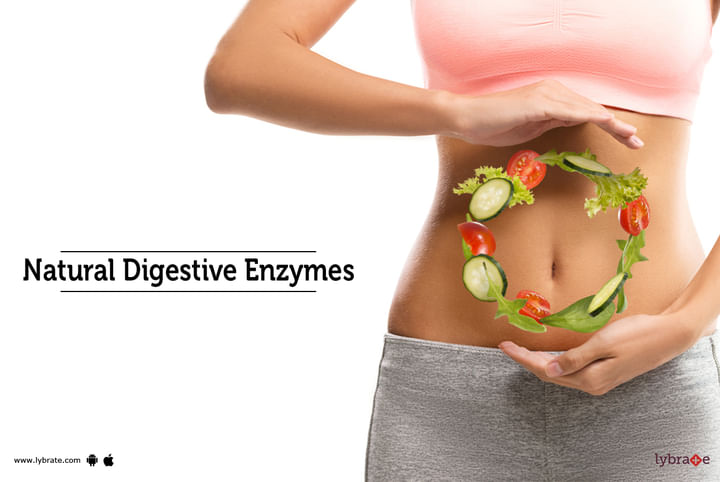Natural Digestive Enzymes
Our digestive system is essentially made up of a group of organs. These organs work together in order to break down the food and liquids we consume into simpler forms.
The separated nutrients, such as carbohydrates, fats, vitamins, and proteins, then reach the small intestine and, therefrom, into the bloodstream. These nutrients, which are directly derived from the food we eat, further provide us with energy to help our bodies grow and repair.
Furthermore, the enzymes that are predominantly responsible for breaking down large molecular weights of food into smaller and more easily absorbable pieces are commonly referred to as digestive enzymes. There are basically three main types of digestive enzymes, which are proteases, lipases, and amylases.
Proteases are a type of enzyme that breaks down protein into small amino acids and peptides, while lipases are enzymes that are meant to break down fat into three fatty acids as well as a glycerol molecule.
Amylases, another type of enzyme, break down carbohydrates, for instance, starch, into simple sugars. It must be known that all of these enzymes are essential for proper digestion to occur.
What Are Natural Digestive Enzymes?
Digestive enzymes play a pivotal role in the digestive process that involves breaking down food so that important nutrients can be properly utilized by the body. However, if the body does not naturally produce enough of certain enzymes—such as the enzymes needed to break down lactose in dairy products—it can slow down the digestion process. This can further lead to a number of gastrointestinal (GI) symptoms in a person, such as bloating, gas, and diarrhea.
Many foods contain natural enzymes that are essential for good digestion and a healthy gut. However, it is important to keep in mind that these foods must be consumed raw (whenever possible) in order to get the most benefit from them. This is because enzymes are often very delicate and can be easily damaged by changes in pH, chemicals, or extreme temperatures.
What Are Some Good Sources of Natural Digestive Enzymes?
Many foods can act as natural digestive enzymes, helping to ease and improve digestion. The following are some of the best ones that you can consume to keep your gut healthy:
Pineapple
Pineapple can work as a great natural enzyme for your body as it contains bromelain, which is essentially a group containing a few vital digestive enzymes. These enzymes are mainly helpful in breaking down proteins and can ease indigestion.
The group of enzymes that a pineapple contains falls into the category of proteases, which are essential for breaking down protein into its component amino acids. It further aids in the digestion and absorption of protein.
There are a lot of vegans or vegetarians among us who tend to remain deprived of animal protein for most of their lives. Pineapple can be a great option for such people. Because it contains bromelain, pineapple can be an excellent meat substitute as it helps the digestive system absorb more essential proteins.
However, it is important to note that these enzymes are usually destroyed by unfavorable conditions, such as heat, so be sure to eat fresh pineapple instead of canned pineapple or pineapple juice. Bromelain is even taken by some people in supplement form for even better digestive support.
Papaya
Papaya is a good source of proteases, which help the body digest protein. Proteases are enzymes that mainly help in the digestion of essential dietary proteins. Proteases break down the proteins in the diet into small amino acids that are used by the body to synthesize new proteins.
It must be noted that papain, which is a specific type of protease found in papaya, can also be found on the market as a meat tenderizer and digestive supplement. Moreover, a number of recent studies have also found that a papaya-based formula may help mitigate many digestive symptoms such as bloating, constipation, etc.
However, if you consider eating papayas, the first thing you should do is make sure that you eat them ripe and uncooked. This is because heat exposure or other unfavorable conditions can destroy their essential digestive enzymes.
Honey
Honey is definitely so much more than merely a sweetener. It is known to contain several enzymes that are beneficial to health. These enzymes are diastases, amylases, and invertases.
They essentially help break down the honey's sugar into smaller molecules so that they can be more easily digested and absorbed as nutrients in the body. Furthermore, honey has been used for centuries as a multi-purpose remedy.
Apart from being a storehouse of those essential digestive enzymes, it is a natural sweetener as well as a powerful antibacterial agent. Honey has been used for healing by humans, probably since the inception of humanity. It is even mentioned in the Bible.
However, the digestive enzymes are mostly found in raw honey. So, if you are looking for a way to supplement your diet with those essential digestive enzymes, you should eat raw honey.
Banana
Bananas have numerous health benefits. However, most people usually think of them only as a convenient food that can be used to fill up their tummies instantly. But they are definitely more than that!
Did you know that this amazing fruit can also help you digest your food? If you eat them before you eat a meal, they can help you digest your food. This is because of the essential enzymes produced by the banana, amylase and maltase.
The complex carbs found in bread and cereals can be broken down with the help of amylase, while maltase helps to break down the malt sugar found in carbohydrate foods, such as starchy grains and vegetables.
So the next time you need a healthy snack, just top your oatmeal or cereal with bananas. You can even try blending them into a smoothie or eating them straight.
Conclusion
Digestive enzymes are essential for digestion, and there are even many other foods out there that contain these necessary enzymes. However, it must be kept in mind that these foods should always be eaten in moderation.
Furthermore, we hope this article was helpful and we look forward to hearing from you if you have any questions. If you are interested in learning more about natural digestive enzymes or similar topics, we earnestly invite you to check out some other articles by us!



+1.svg)
